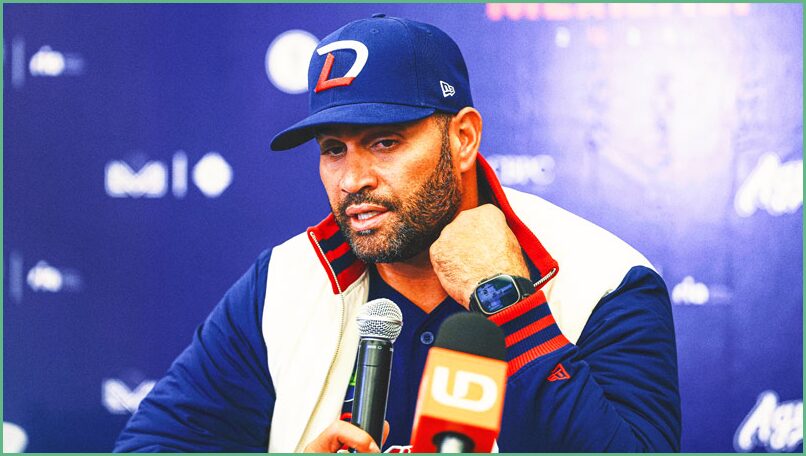Albert Pujols: The Angels’ Next Manager on the Horizon
Rumors are swirling that the Angels are eyeing a familiar face to steady the ship, and it’s hard to ignore the logic. Albert Pujols, a franchise icon and clubhouse heartbeat, is reportedly the “leading choice” to be the team’s next manager. That line alone turns speculation into something that feels very real for fans and players alike.
Pujols isn’t just a name on the wall or a highlight reel; he’s a living link to the franchise’s best days. He spent years carrying expectations and doing the heavy lifting with a bat and a presence that changed games. That kind of credibility matters when a clubhouse needs direction and identity.
Managerial heat isn’t the same as playing pressure, but some skills translate cleanly: leadership, preparation, and the instinct to know when to push. Pujols has been described for years as a natural teacher, someone who explains the why more than the how. Players often respond when a leader’s voice is tied to performance and respect.
There’s an emotional benefit, too—fans love a homegrown hero returning to lead. The PR value is instant, but the deeper payoff could be a renewed culture. A veteran like Pujols can re-anchor standards in ways young managers sometimes struggle to do.
What Pujols Would Bring and What He’d Face
On the plus side, Pujols brings an unmatched resume and the kind of gravitas that makes young players listen. He knows hitting mechanics, situational drills, and how to handle pitching staffs from a hitter’s perspective. Yet knowing baseball deeply and managing a roster through a 162-game grind are different beasts.
He’ll face modern challenges right away: analytics, matchup-heavy pitching changes, and an ever-evolving squeeze between development and winning now. If he leans on a strong bench of coaches who speak numbers fluently, he can balance old-school instincts with today’s tools. The smarter the support staff, the better his raw leadership will translate into wins.
Expectations will spike fast, and the optics of a legend at the helm raise the bar immediately. Fans will want to see improvement in record and culture, not just ceremonies and speeches. Pujols will have to make tough calls, bench stars, and sometimes be the bearer of bad news—tasks that test even seasoned managers.
Front-office chemistry matters more than fans often realize. If the front office gives him autonomy and aligns on roster construction, this could be a smooth transition. But mixed messages and short leashes can sabotage even the most promising managerial starts. Clear expectations have to be set before Opening Day.
On the field, the Angels’ current roster has talent but needs consistent leadership to fulfill potential. Pujols could speed up player development, especially with hitters who want to learn from a hall-of-fame caliber career. Pitching and defense will still need attention, and a manager can only do so much without the arms and gloves to match his strategy.
Public reaction will be loud and emotional, and that can be useful or distracting. The stadium will fill with nostalgia-fueled energy the first weekend, which can translate into momentum. But long-term buy-in comes from day-to-day results, and legends have been booed once the losses mount.
Comparisons will come with other star-turned-managers who succeeded and those who fizzled. Every transition story is unique, but the common thread among successes is adaptability. If Pujols embraces modern methods without losing his identity, he has a real shot at changing the narrative for this franchise.
Look for immediate emphasis on fundamentals and approach at the plate. Pujols’ presence could bring a tougher, more disciplined offensive philosophy, focused on situational hitting and fewer mental lapses. That kind of shift can shave runs off opponents and flip tight games into victories.
Off the field, Pujols could become a powerful bridge to the community and the organization’s future stars. His voice carries weight in the clubhouse and the city, and that can boost ticket sales, youth engagement, and even recruitment. A manager who means something to fans gives the franchise stories to sell and memories to build.
Still, hiring a legend is not a magic bullet, and ownership has to back decisions with smart roster moves. Winning needs arms, defense, and depth; nostalgia won’t fill those gaps. If the front office treats the hire as a headline rather than a rebuild blueprint, the gamble will fall short.
In the end, the idea of Albert Pujols becoming manager is more than sentimental wishful thinking. It signals a chance to reset the culture, hold players accountable, and reconnect with fans in a meaningful way. If handled right, this could be the start of a new chapter that honors the past while building for the future.
